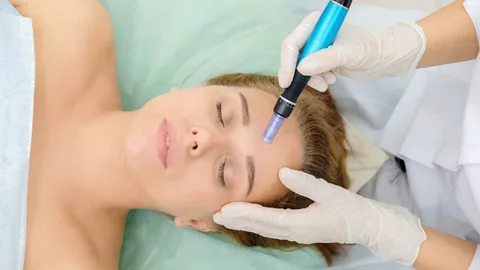Micro-needling is a minimally invasive cosmetic procedure that has gained popularity in recent years due to its effectiveness in treating a variety of skin conditions, including acne. The procedure involves using a device that creates tiny micro-channels in the skin, which then stimulates the skin’s natural healing response and promotes the production of collagen and elastin. In this blog post, we will discuss how micro-needling works to reduce acne and improve skin texture, and the benefits of the treatment.
- How Does Micro Needling Work? –
During a micro-needling treatment, a small device with fine needles is used to create micro-injuries in the skin. These injuries trigger the skin’s natural healing process, which stimulates the production of collagen and elastin. Collagen is a protein that is essential for maintaining skin elasticity, while elastin helps the skin bounce back after being stretched or compressed. By stimulating the production of these two proteins, micro-needling helps to improve the overall texture and appearance of the skin.
In addition to collagen and elastin production, micro-needling also increases the absorption of topical skincare products by up to 300%. This is because the microchannels created during the treatment allow for better penetration of skincare products into the skin. This means that any products applied to the skin after the procedure will be more effective in treating acne and other skin conditions.
- The Benefits of Micro Needling for Acne-
One of the primary benefits of micro-needling for acne is that it helps to reduce the appearance of acne scars. Acne scars are caused by inflammation and damage to the skin’s collagen, which can result in raised or depressed areas of the skin. Micro-needling helps to promote the production of collagen and elastin, which can help to improve the appearance of acne scars over time.
In addition to reducing acne scars, micro-needling can also help to improve overall skin texture and tone. This is because the treatment stimulates the production of collagen and elastin, which help to plump and firm the skin. This can help to reduce the appearance of fine lines and wrinkles, as well as improve overall skin tone and texture.
- How to Prepare for Your Micro Needling Acne Treatment-
If you are considering micro-needling for acne, there are a few things you can do to prepare for your treatment. First, it is important to avoid any exfoliating treatments or harsh skincare products for at least a week prior to your treatment. This is because these products can make the skin more sensitive and increase the risk of irritation during the micro-needling procedure.
It is also important to avoid any blood thinners, such as aspirin or ibuprofen, for at least a week prior to your treatment. These medications can increase the risk of bleeding during the procedure, which can interfere with the effectiveness of the treatment.
Finally, it is important to talk to your skincare specialist about any medications or health conditions you may have prior to your treatment. Certain medications, such as Accutane, can increase the risk of scarring and should be avoided prior to micro-needling. It is also important to inform your skin care specialist if you have any active skin infections or cold sores, as these can increase the risk of complications during the procedure.
- Micro Needling Aftercare: How to Maximize Your Results-
After your micro-needling treatment, it is important to follow a few simple aftercare instructions to maximize your results. First, it is important to avoid any harsh skin care products or exfoliating treatments for at least 48 hours after your treatment. This will give your skin time to heal and reduce the risk of irritation or inflammation.
It is also important to avoid any sun exposure or tanning beds for at least a week after your treatment. micro-needling also stimulates the production of collagen and elastin, which are essential proteins that provide the skin with elasticity and firmness. By promoting the growth of new skin cells and collagen, micro-needling can help reduce the appearance of acne scars and other blemishes.
Another benefit of micro-needling for acne is that it can improve the absorption and effectiveness of acne-fighting products. The microchannels created by the needles allow topical treatments to penetrate deeper into the skin, allowing for better results.
It is important to note that micro needling for acne should only be performed by a trained and licensed professional. The procedure involves using needles to create tiny punctures in the skin, which can lead to infection if not done properly.
Overall, micro-needling can be an effective treatment option for those looking to reduce the appearance of acne and acne scars. By promoting collagen production and improving the absorption of topical treatments, micro-needling can help individuals achieve smoother, clearer and more youthful-looking skin.
If you’re interested in learning more about micro needling for acne or other skin concerns, contact Enhance Aesthetic today to schedule a consultation with one of our experienced skin care specialists. We can help determine if micro-needling is the right treatment option for you and provide guidance on how to properly care for your skin after the procedure.
- Conclusion:
Micro-needling is an increasingly popular treatment for acne and other skin concerns. It works by creating tiny punctures in the skin, which stimulates the production of collagen and elastin, leading to smoother, clearer and more youthful-looking skin. In addition, micro-needling can improve the absorption and effectiveness of acne-fighting products. However, it is important to have the procedure performed by a trained professional to avoid the risk of infection. If you’re interested in learning more about micro needling for acne or other skin concerns, contact Enhance Aesthetic to schedule a consultation with one of our experienced skin care specialists.

